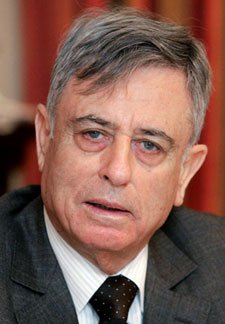Former Syrian Vice President Abdul Halim Khaddam announced yesterday that the opposition “National Salvation Front,” which he founded with the General Observer of the “Muslim Brotherhood” group in Syria, Ali Sadreddine Al-Bayanouni, and other opponents, will focus on activities inside Syria in the coming period to “accelerate the process of change.”
Khaddam, in an interview with the United Press International agency, on the sidelines of the meeting of the Front’s General Secretariat in the Belgian capital Brussels, stated that “the Front’s activity has so far focused on working outside Syria while maintaining contacts inside. However, the work will move inside in the next stage to expedite the process of change.” He refused to provide any details about the methods the Front would use to communicate with the Syrian interior, citing “security reasons.”
The former Syrian official denied that any Arab party had contacted the Front following President Bashar al-Assad’s speech last month, in which he criticized some Arab leaders for their stance on Hezbollah in the recent confrontation with Israel in Lebanon. Khaddam said, “In reality, there has been no contact between us and any Arab party. However, this does not mean the absence of many common alliances with Arab countries.” He added, “In the National Salvation Front, we believe that Syria is isolated on the Arab level now due to Bashar al-Assad’s reckless policy and his attack on Arab countries, cutting Syria’s ties with them.”
Khaddam, who announced his defection from the Syrian regime on December 30th of last year, ruled out the possibility that the Syrian government could repair the damage to its Arab relations, especially with Saudi Arabia. He added that Bashar al-Assad “crossed the point of no return, resolved his matter, and placed himself in the Iranian circle, removing himself from the Arab circle and placing himself in the Iranian circle.”
The defected official pointed out that Assad “believes that Arab countries are unable to protect him and sees that if he becomes a link in Iran’s strategy, Iran can provide him with the protection he wants. If he is forced to flee with his family by plane, he won’t find a haven as warm and welcoming as the Iranian embrace.”
Commenting on the absence of the Syrian president from the Non-Aligned Movement summit in Cuba, Khaddam, who was accused of grand betrayal by the Syrian People’s Council after his defection, stated that “Assad doesn’t sleep; he is extremely worried about the internal situation and fears that if he leaves, he may not return.”
While he believed that the situation in Syria has not reached the stage of a power struggle, Khaddam claimed that “there is anxiety within Bashar about some members of the family, especially from his son-in-law, General Asef Shawkat (head of military intelligence), who some media have recently suggested represents a possible alternative. This idea has taken hold in Bashar’s mind, becoming an obsession that has led him to freeze Asef’s actions, change officers close to him, and limit his powers recently. Now he relies on Asef’s deputy and not on Asef himself.”
In a notable stance, Khaddam praised General Asef Shawkat, describing him as a “brave, intelligent, and cultured officer, one of the prominent security officers in Syria, with strong external relations because he used to coordinate between the Syrian military intelligence and Western intelligence agencies, specifically in the United States and Europe.”
When asked if Asef Shawkat is qualified to succeed the Syrian president, Khaddam answered, “The country is not qualified for anyone who preserves this regime, but what I mentioned about Asef represents my opinion of this man.”
Regarding the situation in Lebanon, Khaddam stated that Hezbollah “prevented the Israelis from achieving victory.” However, he questioned, “Was this operation for the sake of the prisoners or to serve other purposes in Damascus and Tehran? Based on that, there was no victory because victory is achieved when one of the warring parties loses the war. Instead, it prevented an Israeli victory, and that, in itself, was a significant achievement that Israel had not experienced before

